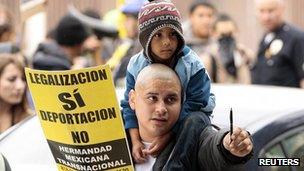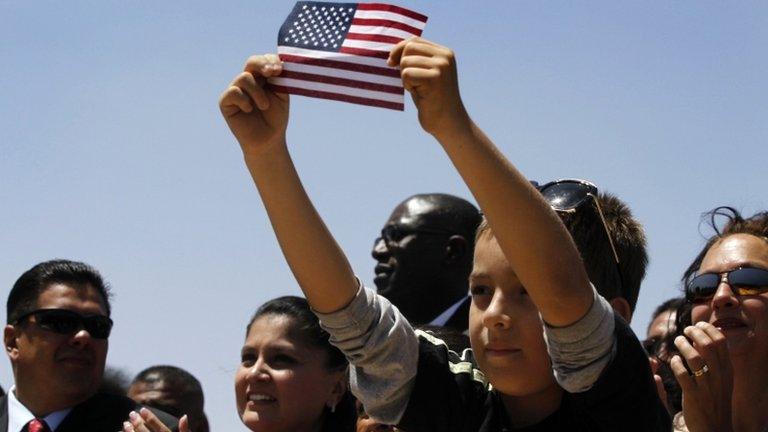Immigration makes election bow
- Published
- comments

Immigration has long been a divisive issue in electoral politics
This is not an amnesty, we are told.
A senior administration official says it is "an exercise in prosecutorial discretion". To many it will look more like a blatant piece of electioneering by Barack Obama, a sop to critically important Latino voters.
Although the numbers are dropping because of the poor economy there are more than 11 million illegal immigrants in the United States, around six million of them from Mexico.
While of course not all Latinos who are legal American citizens have sympathy with illegal Hispanic immigrants, many do.
They are the largest and fastest-growing minority in America and their votes are hugely important in this election in swing states like Nevada, Colorado and Florida.
It is an issue which divides. It was obvious during the Republican primary elections that the conservative grassroots felt very strongly about this.
What they wanted was not anything that looked like an amnesty but tougher border patrols, and higher, longer fences along the border. Perhaps electric ones.
Their worry is that allowing people to stay who have come the the US illegally amounts to a reward for bad behaviour and acts as a magnet for others to do the same.
Why now?
Mitt Romney has taken a tough line, external, refusing to back a plan by Florida Senator Marco Rubio, external to deal with illegal immigration.
And some on his own side worry about this. It is possible that Republicans are ignoring a vast reservoir of potential voters among a largely socially conservative and aspirational community, just as in the 1960s the party of Lincoln refused to court the black vote and instead wooed white Southerners.
Just days ago Jeb Bush urged Romney to change his tone, external.
So this is clear electoral politics. It appeals to vital voters. It pours petrol (gas) on an argument smouldering in Republican ranks. But it is more subtle than that.
Technically those who apply to be exempt from deportation will be granted what's called "deferred action". That runs out in two years time. So the pressure is on Romney to say if he was in the White House by then whether he would renew the policy or round 'em up.
(UPDATE - It has taken about six hours for him to respond, but Romney has now said that this is a problem that has to be solved, and that he agrees with Marco Rubio that legislation is the answer, while the president's move has made that more difficult.)
Not only that. A senior administration official made it clear that people spared deportation would not automatically get work permits and that the move "does not provide a path to citizenship". Only Congress can do that.
This plan looks suspiciously like elements of the Dream Act, and so the pressure will be on Congress to say if they will do something, or do nothing.
So Obama will not be surprised, or indeed worried, if he is accused of naked electoral politics.
I have another question, though. Has he merely delayed a move long backed by many Democrats as plain common sense so he can deploy it to maximum effect, months away from an election?
America's frenetically short two-year election cycle has many effects, and few of them promote good government.
- Published15 June 2012
